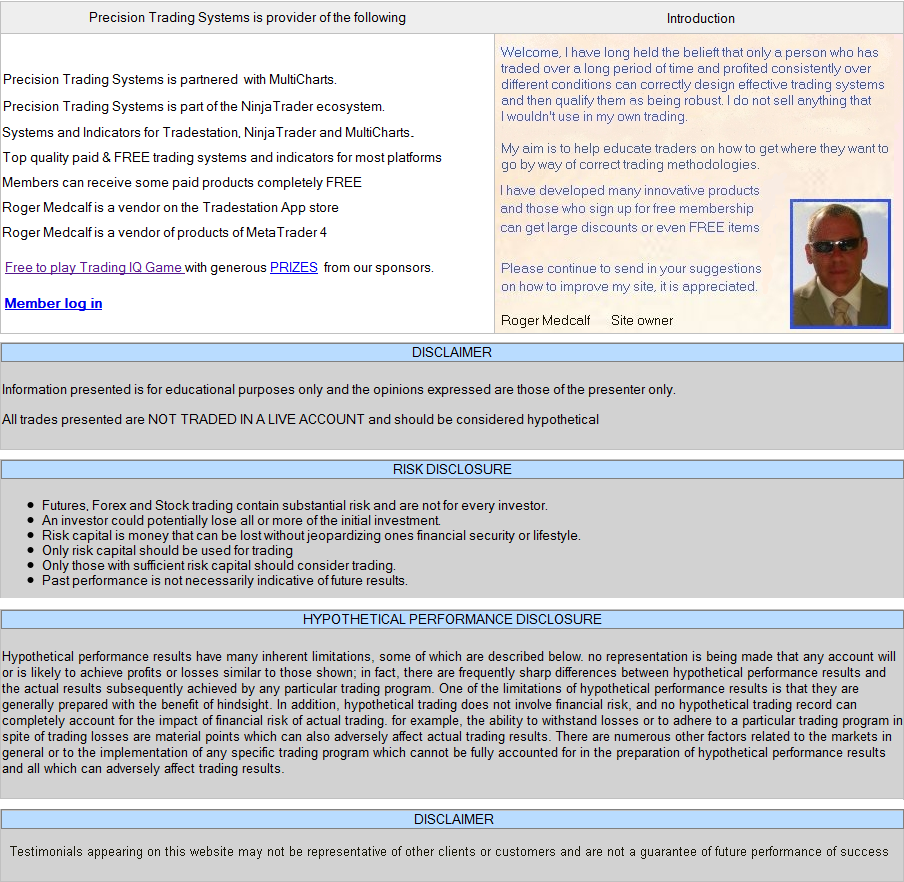
Precision Probability Index for Tradestation comes with two strategies

Please visit the product guide above if you require this
Tradestation product for a different trading platform.
The
contact page here has my email address and you can search the site
If you
like what you see, feel free to
SIGN UP to be notified of new products - articles - less
than 10 emails a year and ZERO spam
Precision Trading Systems was founded in 2006
providing high quality indicators and trading systems for a wide range of
markets and levels of experience. Supporting MultiCharts, Tradestation and
NinjaTrader and soon TradingView.
Page updated July 12th 2023 - New responsive page GA4 added canonical this. 5/5 html baloon
videos added
Precision Probability Index - Computing the precise probability of one price being higher than another any number of bars into the future with 100% mathematical accuracy
This indicator for Tradestation gives you the trader the exact probability of your trade doing what you want it to do. No more guessing in a fully configurable format
Indroduction and concepts of Precision
Probability Index for Tradestation
Precision Probability Index herein
referred to as PPI was a very complex programming task for me and I
was well rewarded for the time invested.
Its a unique piece of kit
that is nothing like anything else out there. You can use it
on any time frame in ticks charts, minute charts, hourly, daily and
most exotic bar types.
There are two
strategies included in the package.
1.
The Signal Line strategy
which is shown in the video below.
This is
NOT trading on the probabilities exactly but when the probability
trend changes direction ( which is a unique approach )
2. The Above Below
strategy
which trades on the crossing of zero
using exact mathematical probabilities ( which you can edit
to add a "dead spot" threshold to prevent over trading )
The
PPI line crossing above the signal line generates a long trade
(Buy) the crossing below the signal line generates a short entry OR
a long exit. (You can choose which).
As with all my products performance will improve if you take the
time to search through lots of markets and look for those with
favourable price action. This also applies to timeframes.
The
average trader will plot it on ES SP500 1 minute future chart and
expect to win. Of course the type of person is not going to win in
the long run as winning by definition requires work.
The forums are full of such
persons. They get good followings as they post a lot of content but
as traders, they would rather type unimformed opinions than put in
the work to scan for suitable
markets.
Those who talk do not know - Those who know do not
talk.
People who just rely on other forum users to tell them if a
product is good or not can never understand the recipe for success
is a very simple one....
TRADING TO WIN OVER THE LONG
RUN REQUIRES WORK
Video clip below shows
the Precision Probability Index above and below
strategy for Tradestation
The zero line in this example is the
trigger that generates buy signals. In this example as it is a
generally trending up market, the signal is set to long only (Which
is often better)
You can of course set it to take short
trades by enabling short selling = true. This signal generates less
trades than the signal line strategy if the same periods are
entered.
This model is acting on pure probabilities and
buying then the odds are > 50% of a move up occuring. Exit long when
< 50% Very simple really.
Special features of Precision Probability Index
The
exaggeration factor, which as you would expect exaggerates the
truth, telling lies about reality.
You might wonder why one
would want to do this and the best way to explain it is to view the
screenshot below which has turned PPI into a digital signal
processing unit or "DSP"
The plot now only has two places to
visit, 0 and 100. The 0 means sell and the 100 means buy. A simple
way for a beginner to understand how to operate a trend following
system.
You can set the strategy and the indicator to
function in this manner by typing larger and larger values into the
exaggeration factor input, all the way up to 100 or 200 for example.
This product can bend and twist with you to suit whatever
abstruse or bizzare trading style you wish to implement. Yes
really, it is that versatile.
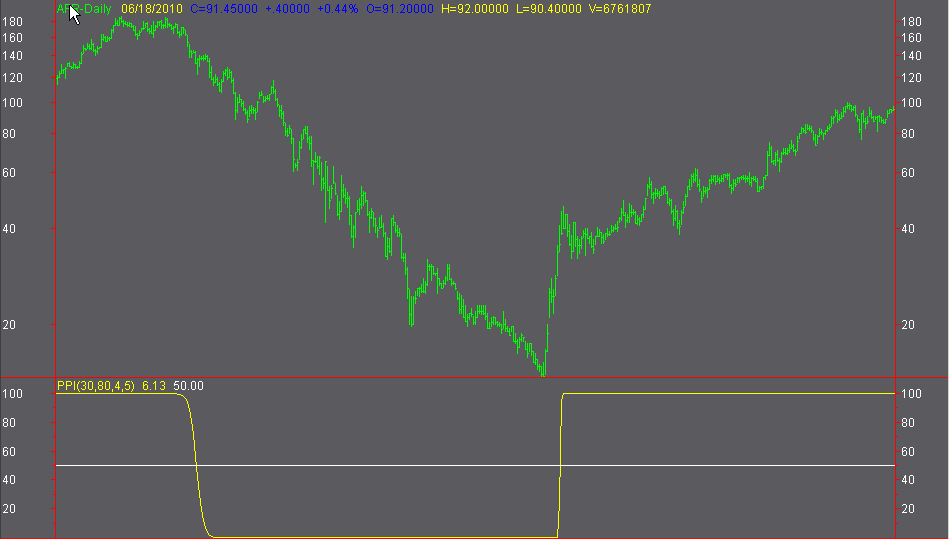
Other "accidental" discoveries of the PPI
indicator
In the example below you can observe ( if you are
observant ) that there is a support level that forms approximately
around the 50 level of equilibrium that leads to the market price
bouncing up away from it each time it gets there.
You can
translate this phenomenon into traders who are accumulating stock
each time it becomes mildly oversold, they want to buy cheap but
they also want to keep the uptrend going up
thus preserving a
bullish sentiment for the market to see.
This price action
is generally caused by long term players in for a few years or if
you see it in intraday futures, you can still call them long term
players in for a few hours!
You wont see this all the time, but you will often
see it in choppy uptrends ( and choppy downtrends acting as
resistance )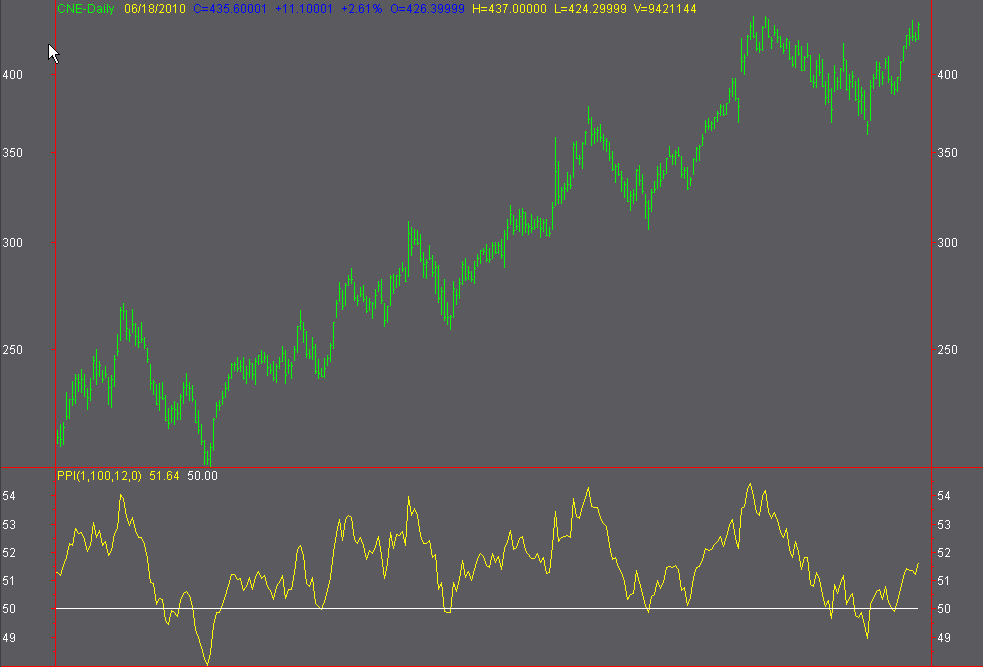
The shot below shows such a choppy down trend with the 50
equilibrium level acting as resistance.
You can sometimes observe
this effect in other indicators such as Demand Index
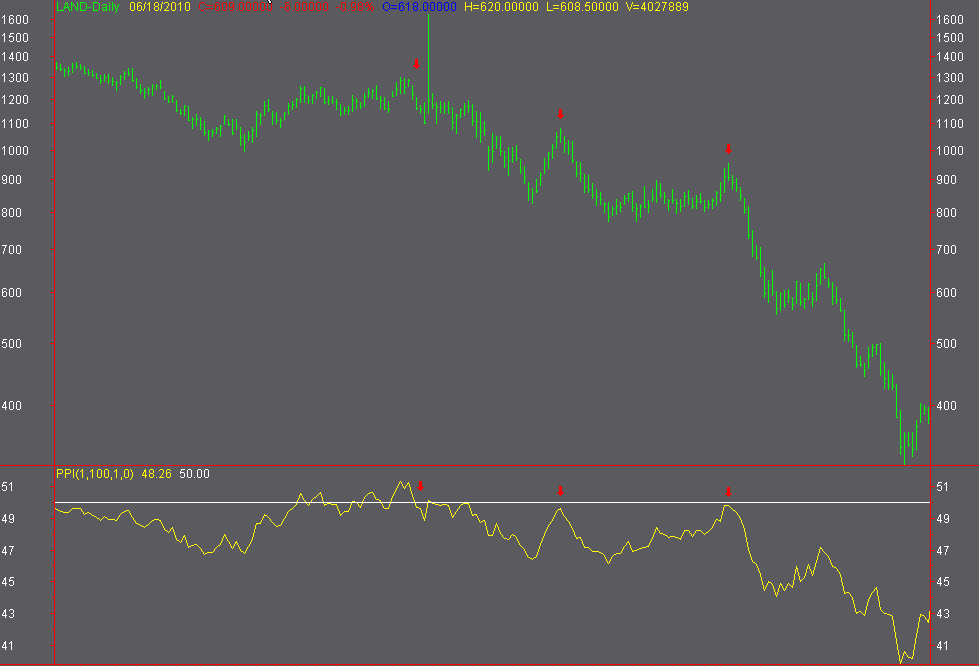
View
license prices for Precision Probability Index for Tradestation
So now for the literature about how this gadget works
This product computes the probability of
one moving average being above another in x bars into the future.
The short period average would usually be about 2/3 of the slow
moving average. But please feel free to experiment.
If you
use lengths which are short such as short length 8 and slow length
15 you will see a lot of signals occuring around the 50 level as the
battle between bulls and bears occurs.
In the shot below this
irons out into longer lasting trades when a trend develops.
To reduce the number of tiny wins and tiny losses that occur at 50
fluctuations, I have build in a threshold which you can set to buy >
50.5 or 50.03 etc and sell < 49.8 or 49.99 etc.
This has the
effect of reducing whipsaw trades by delaying the entries slightly.
Shot below shows faster settings 8 and 15
Notice how close the line gets to 50 very
often then scroll down to the next image which uses the
threshold feature...
Please compare these two charts below which use a different threshold
setting.
The threshold iS ZERO in the first one which means it buys > 50
and shorts < 50.
The image under is using a threshold of
3, notice the difference?
Threshold changed below
to allow a "dead spot"
In the shot below as the yellow text
says the thresholds have been reset to buy above 53 and sellshort
below 47.
This reduces whipsaw trades at the expense of some
delay.
The bars future feature.
This is the number of bars into the
future that the plot will
calculate the probability of the short average being above the slow
average.
This is the least important feature for trading results but
is nice to punch in the numbers and know the exact chance of X being
above Y in 20 bars time.
Key points to remember:
Reducing the bars future values will increase the volatility of the
PPI plot
Increasing it will reduce the volatility of the
plot.
The plot will not change "shape" when altering the bars future
value and the crossing of 50 will be the same.
It is
suggested to use a small value between 2 and 5 etc.
A very important points below
If you are setting this up on a short
term time frame such as 1 minute or 20 tick chart the amount of
threshold you type must be MUCH SMALLER.
You will need to
include multiple decimal places such as buy above 50.03 and sell
below 49.95 etc to see the effect. In some cases three decimal
places will be needed.
Typing in large numbers
on short term time frames will result in zero trades occuring as the
mathematical probabilities will shift to a microscopic degree.
Also you need to use smaller threshold values with slower
lengths of PPI averages. In the shot below it is a fast setting of 8
and 15 which is posted on a daily chart with a threshold of 3
points
used.
If this setting was applied to long term PPI averages
like 20 and 28 the thresholds would need to be reduced to 1 or 2 or
thereabouts.
Using the readings
for a trade evaluation
In
the image below you can see the exact probabilities based on the
white moving average line (3 period) being above the yellow moving
average line (50 period) in 4 bars time.
From left to right
1st =
47.2%
2nd = 73.3%
3rd = 81.5%
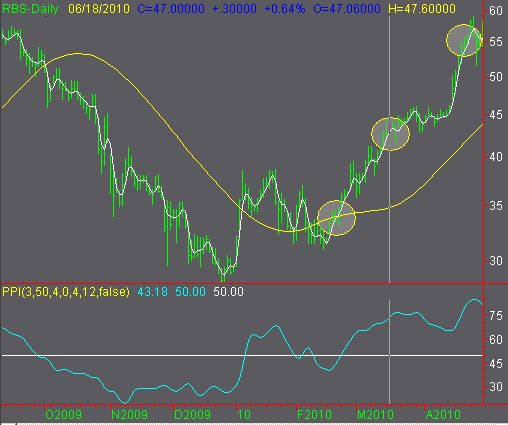
For intra day use in day trading on minute and tick charts
Precision Probability Index uses
volatility to assist in measuring the true percentage probability of
a fast moving average being above a slower moving average.
When plotted on a short term intra day chart such as 20 ticks or 30
seconds or 5 minutes, there is naturally smaller volatility values
being passed to the algorithm.
TThe resulting output of the PPI indicator will be much
smaller in terms of the probability score. You will see numbers like
50.004 and 49.992 for example.
This will require you to
input smaller values into the above below strategy to see trades. br>
This product is
also available as a combo trading system.
Check out the combo page here
View
license prices for Precision Probability Index for Tradestation
The help and advice of customers is valuable to me. Have a suggestion? Send it in!
About
